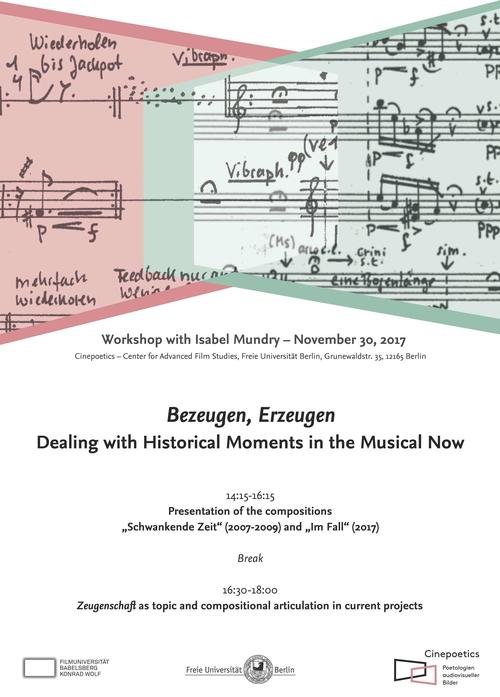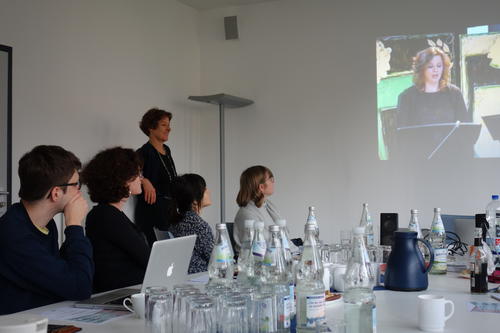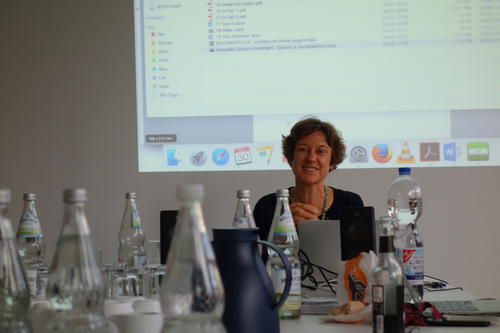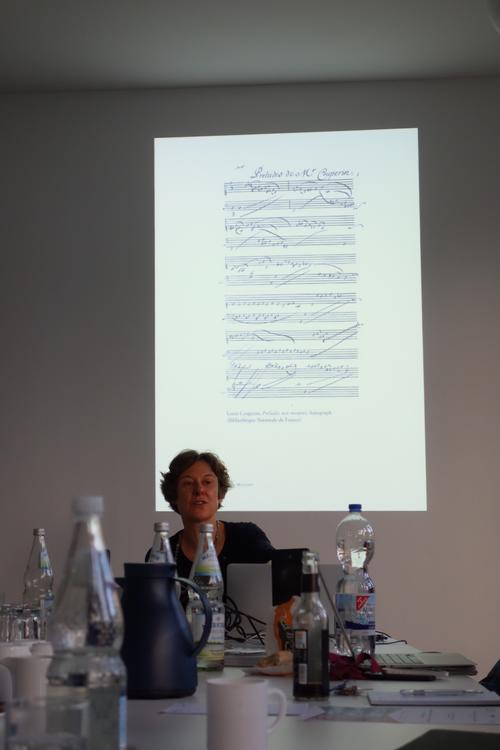Bezeugen, Erzeugen - Dealing with Historical Moments in the Musical Now
30.11.2017 | Workshop der Kolleg-Forschungsgruppe Cinepoetics mit Isabel Mundry.
In close connection to her background as a composer, senior fellow Isabel Mundry created a way of looking at historicity from a musical point of view. The workshop "Bezeugen, Erzeugen. Dealing with Historical Moments in the Musical Now" took to discussing this point of view with relation to Mundry's own work as well as this year's research focus on cinematic image and historical experience.
By presenting an adapted version of Marc-Antoine Charpentier's aria-piece "Depuis le jour," Isabel Mundry defined three key concepts when dealing with the historicity of musical phenomena. First, the "aspect of interpretation" is of interest as it questions the relation between text and identity of a piece. Each interpretation creates different "nows" and is subject to change with each level of the recipient’s historical knowledge.
The second aspect, "contextualization", focuses on the setting of each performance. Set design is different for each performance of an opera piece, for example, while the disposition of the recipient changes as well. The act of listening and memorizing the experience of it can change with its locatedness. Furthermore, Mundry mentioned a third aspect she titled "performance of the now". This aspect is, unlike the other two, unrepeatable. Variable aspects like movements or gestures differ not only between versions of a piece, but with each new interpretation. Here, she sees a uniqueness in the moment of creating an experienced historical now.
In a different musical example, Louis Couperin's "Préludes non mesurés", Mundry worked out musical indices of memory in the reading of sheet music. She described a close relation between memory and improvisation in Couperin's piece. The oscillation in reading it, she explained, can inform the composer's work on his or her own piece. Personally, Mundry based her piece "Schwankende Zeit" on Couperin's example, in which she discovers a film-like zoom effect as she plays the notes slower than in the original. This leads to what she called a "heightened value of time."
Being influenced by many different composers and pieces, Mundry compared her way of working to an archaeologist's approach to music. This creates a clash of different languages and tonalities that turns against labels like avant-garde, postmodernism, or even naivité. There is a paradox of composing in modern music: "It's like being the architect of a building and living in it at the same time," she explained. But it is not only the influence of other compositions that work like this. In Mundry's piece "Im Fall," one can sense the act of falling (metaphorically) while listening to a musical interpretation of a Japanese pachinko machine.
In an additional session, Mundry continued to talk about her approach to historical "nows" from a political perspective. She shared her analytical thoughts on a cell phone video that was recorded on the day of the 2016 mall shooting in Munich, where a young man had run amok and killed nine people. The video (which went viral shortly after the incident) was shot by a neighbor, who - filming the perpetrator on a parking deck nearby - can be heard having an angry conversation with him. With a closer look at the statements of both neighbor and perpetrator, Mundry noticed a dissociation of the situation: what each person was shouting was actually rooted in a different moment.
These different and violent modes of speech (that also addressed diverging attributions of "you" in both singular and plural form) contributed to the impression that terror could be defined as a speech act. As was also brought up in the following group discussion, this video can be seen as a co-production in the moment of filming, thus dealing with different conceptions of public staging and witnessing and containing multiple levels of temporal and political complicity.



